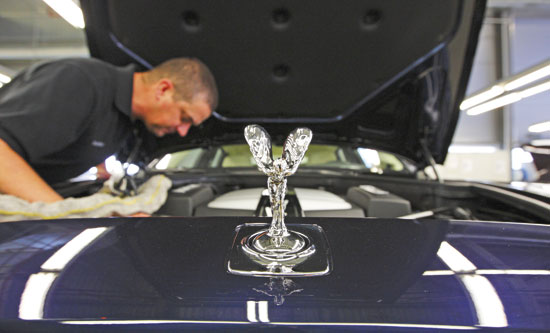
UK manufacturers retain competitive edge by cashing in on export opportunities
British engineering has long been a poor cousin to its German counterpart, but the UK government hopes to change that with new alliances.
Advanced manufacturing and engineering companies in Britain are increasing their exports to China even as the British government shifts its strategic focus from financial services to technology exports to promote growth.
|
 Manufacturers of made-in-UK products such as Rolls-Royce cars regard China as a key market. [Photo/China Daily] |
Rising labor costs over the centuries have eroded the capacity of heavy industry, but investment in technology and innovation has kept advanced manufacturing and engineering industries competitive.
"We continuously invested in technology to make our production efficient, and consequently our products are cheaper than that of our Chinese competitors," said Rob Holmes, sales manager of Bulwell Precision Engineers, a manufacturer of aircraft components in the English Midlands.
The company has sold aircraft components to Chinese importers of Airbus aircraft and Rolls-Royce aircraft engines for a decade, including Xi'an Aero-engine Company.
As the imported aircraft and engines are partly assembled in China, the Chinese importers could have bought some of the smaller components from local suppliers, but Bulwell's price competitiveness helped it to secure growing orders.
"We keep labor to a minimum. For example, if we used to have one worker control one machine, we now have one worker control three machines," Holmes said.
Although Bulwell has no representative office in China, its engineers visit Chinese customers every year to sound them out on their needs.
"Our exports to China have grown alongside China's imports of aircraft, and we expect this market to be huge over the next few decades," he said.
This month the US aircraft manufacturer Boeing forecast in a market outlook that China will need 5,260 new commercial airliners valued at $670 billion over the next 20 years.
Like Bulwell, advanced technology is also giving the British company Satra Technology a competitive edge in China.
Having entered China in the 1970s to provide a leather grading system to help Chinese tanneries understand the quality requirements of Western brands' outsourcing production, Satra has started selling its leather testing machines to China's domestic shoemakers in recent years.
In April Satra opened a laboratory in Dongguan, an export hub in Guangdong province, to provide tailored services to its customers, including product research, design and testing, chemicals analysis and quality control.
Bulwell and Satra's stories are shared by many more small and medium-sized businesses in the English Midlands, Britain's manufacturing hub, where abundance of coal and steel paved the way for the Industrial Revolution.
According to UK Trade and Investment statistics, East Midlands' exports to Asia and Oceania - in which China comprises a great many - was worth 2 billion pounds ($3.2 billion) in the six months to June, a 24 percent increase on the corresponding period last year. The region's exports to its biggest market, the European Union, shrank from 4.2 billion to 4 billion pounds.
Realizing the need to look beyond traditional markets, the British government staged an exhibition to showcase its advanced manufacturing and engineering brands at the Science Museum in London during the recent Olympic Games.
 Washington to remain focused on Asia-Pacific
Washington to remain focused on Asia-Pacific RQFII target blue chips amid bear market
RQFII target blue chips amid bear market Australian recall for top two exporters
Australian recall for top two exporters China fears new car restrictions
China fears new car restrictions